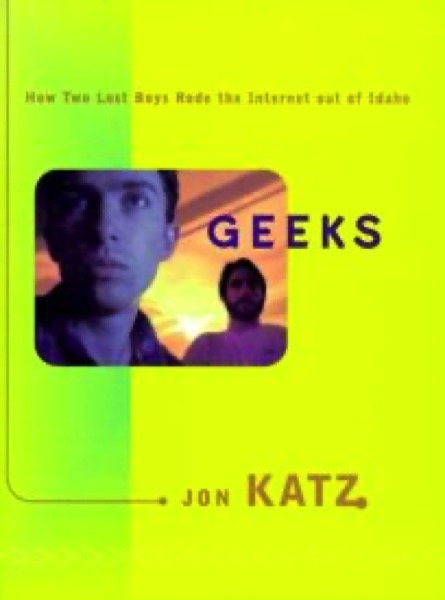
Geeks was published in 2000, which feels like a very long time ago. It is a non-fiction book about two computer-savvy young men in the 1990s who used technology to “make it possible to change their lives and alter their destiny”. Some part of this book were originally published in Rolling Stone before the book was published.
My copy of this book is hardcover and is smaller than a standard hardcover book. It is not nearly as bright as the one posted at the top of this book review. That difference could be due to the fact that it came from a local used book store.
Before you get into the actual story, the book includes several definitions of the word “geek”. The introduction is a mini non-fiction story that briefly goes over the author’s description of how he ended up writing this book (and the Rolling Stone articles before it).
Geeks follows the lives of Jesse and Eric, two 19-year-old geeks who lived in Idaho. They eventually decide to move to Chicago, where they thought they would have a much easier life. It doesn’t work out the way they hoped it would.
The most interesting part of this book, at least to me, are the descriptions of the computers the young men were using. If you were about the same age as Jesse and Eric back in the 1990’s you may feel some nostalgia about how things used to be. People who too young to have memories of that time will probably be horrified by how limited those computers seem today.
Here is a description from an early part of the book:
Jesse’s computer was a Pentium II 300, Asus P2B (Intel BX chipset) motherboard: a Matrix Millenium II AGP; 160 MB SDRAM with a 15.5 GB total hard-drive space; a 4X CD-recorder; 24X CD-ROM; a 17-inch Micron monitor. Plus a scanner and printer. A well-thumbed paperback – Katherine Dunn’s novel Geek Love – served as his mousepad.
Eric’s computer: an AMD K-6 233 with a generic motherboard; an S3 video card, a 15-inch monitor; a 2.5 GB hard drive with 36 MB SDRAM. Jesse wrangled those parts from work.
Jesse worked for a computer store. His job was pretty flexible, and he was allowed to play video games on store computers while waiting for someone to bring in something that needed repair. Eric worked at an Office Max.
It would have been really easy to abscond with a random computer part or two at one of those computer repair places back in the day. I say this as a person who, back in the mid-to-late 1990’s, was dating a guy who worked in an IT department. He managed to gather up enough discarded parts to build me a PC computer.
The guys had linked their computers and played Quake II together. Jesse listened to music and answered ICQ questions while playing. Jon Katz said that somebody called and asked about ordering an ID card – which Jesse could supply. People paid $50 for it. Others emailed MP3s to him, or software and upgrades to Quake and Doom I.
I guess what I’m trying to say is this book provides some vivid examples of how the world has changed. It was a time when people who knew a decent amount about computers and the early internet could get a job pretty much anywhere. Jesse and Eric were able to move from Idaho to the outskirts of Chicago and rent an apartment for a pittance of what that would cost today.
Geeks – by Jon Katz is a post written by Jen Thorpe on Book of Jen and is not allowed to be copied to other sites.
If you enjoyed this blog post please consider supporting me on Ko-fi. Thank you!
